Past Events
2014
November
Final RegioConf Conference, 14 November 2014, European Parliament, Brussels
The Final Conference on “The EU, Regional Integration and Conflict Resolution” took place in the European Parliament in Brussels on the 14th of November 2014, which gave the researchers the opportunity to finally present their findings to the public. The one day conference was composed by 5 Panel sessions each dedicated to the regions Europe, the Mediterranean, Sub-Saharan Africa, Latin America and Asia. During the day, the international team had the unique opportunity to inform, discuss and share its ideas with the audience after two years of in depth research in the EUs political strategies for deepening regional integration in the four regions.
Please click here for the report on the final RegioConf conference. Please click here for the booklet of the conference.
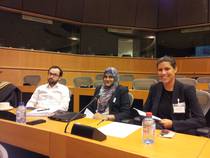

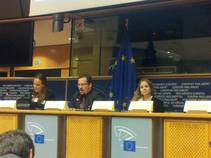
October
RegioConf Regional Workshop, Rome, 10 October 2014
The internal project workshop hosted by the Institute Affari Internazionali (IAI) on the 10th October 2014 provided an overview over the current drafts of each researcher and further gave everyone the opportunity for final feedback and for eventual last revisions. One of the most important questions for the workshop was how to combine the individual findings with each other and to suggest possible linkages to create cross references between each of the chapters. The workshop also had the aim to indicate what eventually was still missing and what could be improved for the final draft. The one-day workshop was composed by 5 Panel sessions each dedicated to one of the regions analysed by the project: namely Europe, the Mediterranean, Sub-Saharan Africa, Latin America and Asia.
For a detailed report, please click here.
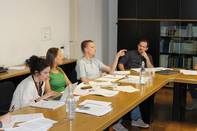


July
Panel “Linking the Promotion of Regional Integration and Conflict Transformation within Different World Regions: Another EUtopia?” at the FLACSO-ISA Joint Conference, 2014, Buenos Aires, July 23rd-25th
The presentation of several articles at the International FLACSO/ISA conference at the School of Economics of the University of Buenes Aires was closely linked to the project, thus the participation at the conference was a very fruitful experience for the participating project members Marco Pinfari, Kai Lehmann and Eva Scherwitz, who convened and chaired the panel. The presented papers were discussed by Dr. Juan Pablo Prada Lallande, Academia de Relaciones Internacionales at the Facultad de Derecho y Ciencies Sociales of Univeresidad Autónoma de Peuble in México. Juan Pablo has worked for the European Commission in the past and has also written his PhD on the EU and international relations. Thus he seemed the perfect match in order to discuss the project papers papers, as he combines both knowledge on international relations and the EU.
Papers presented and discussed:
- Dr. Eva Scherwitz: Conflict transformation via regional integration: An adapted EU approach towards Asia and Latin America
- Dr. Marco Pinfari, Hirah Azhar, Justine Louis: Regional Integration and Conflict Resolution in the Mediterranean Neighborhood: One Step Forward, Two Steps Back?
- Dr. Kai Enno Lehmann, The European Union and the promotion of regional integration as a way to resolve regional conflicts in Latin America – still a viable option?
June
RegioConf Workshop in Pretoria, South Africa, 3 June 2014
The third regional workshop for the RegioConf project was hosted by the Centre for the Study of Governance Innovation (GovInn) of the University of Pretoria. The one day workshop brought together practitioners, scholars and students in the fields of regionalism, conflict studies and Africa-European Union (EU) relations aiming to discuss the findings of the African case studies of the project. The workshop was introduced by a keynote address, followed by three panel sessions, a book launch as well as an evening lecture. The first panel, presented by Thomas Diez and Nathalie Tocci, summarised the RegioConf project and its conceptual framework, followed by an overview of the EU perspective on regional integration and conflict transformation (Eva Scherwitz). This panel was followed by two panels on a case-studies presenting West Africa the Great Lakes. The workshop closed with a launch of the Handbook of Africa’s International Relations by Tim Murithi and an evening reception and a lecture by Prof. Peter Katzenstein who analysed the intersection between regionalism, globalisation and conflict and provided new frameworks for the analysis of how regionalism is evolving in the 21st century.
For the detailed report on the conference, please click here.
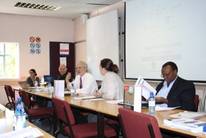
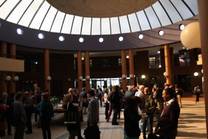

RegioConf Panel "Regional conflicts as security challenge for global governance. Can the EU approach of regional integration serve regional demands?" at British International Studies Association, BISA, June 18-20, Dublin
Regional conflicts can be interpreted as a main challenge to global governance. They threaten international peace, affect global actors’ strategic interests and alter their normative claims. The EU's example shows that regional integration (RI) is a promising way to address such conflicts. However, has this example had any impact on conflict transformation in other world regions? What does the EU supply in terms of the promotion of RI processes and how do regional actors respond to this?
The EU´s approach of promoting RI and its goal of transforming conflicts abroad were compared in four different world regions at the course of this panel: the Mediterranean, Africa, Central and South America and East Asia.
By comparing different forms of promoting regional processes, this panel set out conditions and criteria for successful conflict transformation. Panelists drew upon examples of relevant regional conflicts in order to show the differences in the EU approach and the differing responses to it by local actors. The panel thus generated a broad understanding on how the link of RI and conflict transformation plays out in specific regional conflicts.
5 papers where presented by the project team in order to discuss first results on the EU's promotion of regional integration and conflict transformation at a major European Conferenc:
- Dr. Eva Scherwitz/Dr. Giovanni Faleg: Transforming conflicts through regional integration: has the EU lost its narrative?
- Sonja Theron/Dr. Guilia Piccolino: The EU, Regional Co-operation and Conflict Transformation in Africa
- Dr. Kai Enno Lehmann: Learning with experience? The evolving approach of the European Union to the promotion of Regionalism as a tool for conflict resolution in Latin America
- Hirah Azhar/Justine Louis: Squaring the circle? The EU, Regional Cooperation and Conflict Transformation in the Middle East and North Africa
- Dr. Moosung Lee: The prospects for regional conflict resolution in Asia: the case of North Korea and the South China Sea dispute
Dissemenation Seminar: "The EU, Regional Integration and Conflict Resolution", organized by the Center for International Affairs, Myongji University, Seoul, Korea, co-organized by Kida, Hanyang University, HUFS, June 26, 2014
The seminar was organized by Professor Moosung Lee and included international experts from Asia, USA and Europe. The event included deep discussion on the regional conflict challenges in the Asia context and the role of the EU and proved to be a valuable experience for all participants.
The seminar included the following panels:
- Regional Cooperation and Regional Conflicts: Theoretical frameworks and methodology
Chair: Jin-Woo Choi (Hanyang University, Korea), Speaker: Thomas Diez (Tübingen University, Germany). Discussants: Sanyi Yang (National ChunHsiung University, Taiwan), Nam-Kook Kim (Korea University, Korea), Jung-Min Suh (Yonsei University, Korea)
- The EU's Asia Policy: Regional Cooperation and Regional Conflicts
Chair: Si-Hong Kim (Hankuk University of Foreign Studies, Korea), Speaker: Eva Scherwitz (Tübingen University), Discussants: Higashino Atsuko (University of Tsukuba, Japan), Sung-Won Yoon (Suwon University, Korea), Bong-Chul Kim (Hankuk University of Foreign Studies, Korea)
- Regional Cooperation and Regional Conflicts: North Korean Nuclear Crisis
Chair: Woosang Kim (Yonsei University, Seoul, Korea), Speaker: Moosung Lee (Myongji University, Seoul, Korea), Discussants: Jin-Ah Kim (Korea Institute of Defense Analyses, Korea), Poupeau Vincent-Guillaum (Delegation of the EU to the RoK), Suk-hee Han (Yonsei University, Korea), Patrick McEachern (US Embassy), Jae-Hui Kim (Ministry of Foreign Affairs, Korea), Pyeong Eak An (Teagu University, Korea)
- South China Sea Territorial Disputes: Regional Cooperation and Regional Conflicts
Chair: Yeo Lay Hwee (EU Centre in Singapore, Singapore), Speaker: Yeikyoung Kim (National Assembly Research Service, Korea), Discussants: Pang Zhongying (Renmin University of China, China), Nguyen Hung Son (Diplomatic Academy of Vietnam), Cheng Chwee Kuik (National University of Malaysia), Gyu-Kang Lee (Korea Institute For Defence Analyses, Korea), Chin Kai (Deajin University, Korea)
April
RegioConf Regional Conference in Cairo, 29 April 2014.
The second regional workshop for the RegioConf project was hosted by the American University in Cairo (AUC) to provide a forum for the discussion of regional integration and conflict resolution in the Middle East and North Africa (MENA) region. Along with project partners, the workshop also brought together academic experts and practitioners on the Western Sahara and Israeli-Palestinian conflicts from Europe, North America and the MENA region. Consisting of five sessions, the workshop kicked off with an introduction to the project framework by Thomas Diez and Nathalie Tocci and a keynote address by Rosemary Hollis, followed by panels on the Israeli-Palestinian and Western Sahara case studies and ending with a roundtable discussion on the future of the EU’s involvement in conflict resolution and regional integration.
Please click here for the detailed report of the second workshop.
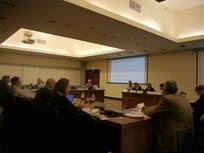


March
RegioConf Regional Workshop in Sao Paulo, 13/14 March 2014, Universidade de Sao Paulo, Brazil
The first regional project workshop hosted by the Institute of International Relations of the University of Sao Paulo has brought together project partners as well as Latin American (LA), European, Northern American researchers and practitioners in order to discuss the role of the EU in the process of regional integration and conflict resolution in Latin America. The two-day workshop was composed of four Panel sessions. The first panel served as introductory session for the project framework and the presentation of both the European as well as the LA perspective on contemporary regional security issues. The second panel underlined the need for the EU to adopt a more humble attitude by firstly understanding the specific nature of LA regional integration and underlying conflicts. Finally the third and fourth panel of the workshop addressed specific case studies, namely the coup d´état in Honduras of 2009 and its implication for Central America, as well as the conflict among Colombia Venezuela and Ecuador.
Please click here for the detailed report of our first regional workshop.
January
RegioConf Midterm Workshop, 30/31 January 2014 in Rome
The mid-term workshop in Rome hosted by the Institute Affari Internationali (IAI) was aimed at providing the project team with a primary feedback on the results and the outputs of their fieldwork. On the one hand, five regional panels were set up for researchers to present and discuss their first findings on the EU`s approach towards regional integration and the transformation of regional conflicts from their local viewpoint (European, African, Mediterranean, Latin American and Asian). On the other, practitioners and academic experts of the regions were invited to act as discussants and deliver specific comments to the presentations. The last session allowed project partners to point out any research related challenges, discuss possible solutions and examine the future development of the project such as publications strategies and other organisational matters.
2013
April
Panel "Model Europe? The European Union, Conflict Transformation and the Diffusion of Regionalism" at the International Studies Association (ISA) Convention, 3-6 April 2013 in San Francisco
Papers presented:
- Thomas Diez, Nathalie Tocci, Eva Scherwitz and Giovanni Faleg (2013): The EU, Regional Conflicts and the Promotion of Regional Integration: Setting The Framework of Analysis
- Lorenzo Fioramonti (2013): Paper temporarily not available
- Kai Lehmann (2013): Adjusting to changing political and economic dynamics: The European Union and its efforts to promote regional integration in the Americas
- Moosung Lee (2013): Full Commitment or Indifference?
All conference papers of the RegioConf panel can be accessed here.
February
RegioConf Kick-Off Workshop in Tübingen, 8/9 February 2013:
The Kick-off Workshop in Tübingen gave the project team the chance to meet each other in person and to discuss the conceptual framing of the project: Defining regional conflicts, the global challenge of resolving them, and the links between regional conflict resolution and regional cooperation/integration. Furthermore, the research partners presented the case studies which were discussed fruitfully during the workshop. The workshop also contributed to a first theory paper of the RegioConf project which can be downloaded here.
